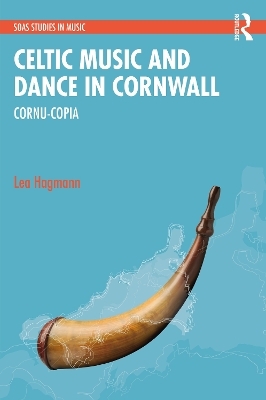
Celtic Music and Dance in Cornwall
Cornu-Copia
Seiten
2021
Routledge (Verlag)
978-0-367-69141-7 (ISBN)
Routledge (Verlag)
978-0-367-69141-7 (ISBN)
Focusing on the Cornish Music and Dance Revival, it investigates the revivalists’ claims about Cornwall’s cultural distinctiveness and Celtic heritage, both which are presently used as arguments to promote the English county’s political status as an independent Celtic nation.
Focusing on the Cornish Music and Dance Revival, this book investigates the revivalists’ claims about Cornwall’s cultural distinctiveness and Celtic heritage, both which are presently used as arguments to promote the English county’s political status as an independent Celtic nation. The author describes two different revival movements that aim at reviving Cornwall’s culture but seem to have entirely different ideas about the concept of authentic Celto-Cornish music and dance. In the first part, historical sources connect Cornwall to its Celtic roots, with an analysis of how the early Cornish revivalists used, changed and adapted this material during the 1980s in order to create a Celto-Cornish revival corpus. In the second part, the book addresses the desire of the Cornish people to express their local and Celtic identities through music and dance, and various practices musicians and dancers have developed to do so. The Nos Lowen movement, which started in the year 2000, is important in this study because it has expanded and newly interpreted the concepts of ‘traditional’, ‘Celtic’ and ‘authentic’.
Focusing on the Cornish Music and Dance Revival, this book investigates the revivalists’ claims about Cornwall’s cultural distinctiveness and Celtic heritage, both which are presently used as arguments to promote the English county’s political status as an independent Celtic nation. The author describes two different revival movements that aim at reviving Cornwall’s culture but seem to have entirely different ideas about the concept of authentic Celto-Cornish music and dance. In the first part, historical sources connect Cornwall to its Celtic roots, with an analysis of how the early Cornish revivalists used, changed and adapted this material during the 1980s in order to create a Celto-Cornish revival corpus. In the second part, the book addresses the desire of the Cornish people to express their local and Celtic identities through music and dance, and various practices musicians and dancers have developed to do so. The Nos Lowen movement, which started in the year 2000, is important in this study because it has expanded and newly interpreted the concepts of ‘traditional’, ‘Celtic’ and ‘authentic’.
Lea Hagmann is a lecturer and postdoc researcher in Cultural Anthropology of Music at the University of Bern, where she is also the Director of Studies in World Arts and Music.
Introduction
1 Cornish Distinctiveness: History and Language
2 Celtic Traces in Cornish Music and Dancing
3 Anglo-Cornish Traditions
4 The Role Models: Cornwall and Circumambient Revival Movements
5 The Cornish Music and Dance Revival: Early Research and Publications
6 Developing and Expanding Cornish Music
7 The Nos Lowen Movement
8 Dissemination, Institutionalisation and the Second Generation
9 Conclusion
| Erscheinungsdatum | 11.10.2021 |
|---|---|
| Reihe/Serie | SOAS Studies in Music |
| Zusatzinfo | 10 Line drawings, black and white; 26 Halftones, black and white; 36 Illustrations, black and white |
| Verlagsort | London |
| Sprache | englisch |
| Maße | 156 x 234 mm |
| Gewicht | 453 g |
| Themenwelt | Kunst / Musik / Theater ► Musik |
| Geisteswissenschaften ► Geschichte ► Regional- / Ländergeschichte | |
| ISBN-10 | 0-367-69141-8 / 0367691418 |
| ISBN-13 | 978-0-367-69141-7 / 9780367691417 |
| Zustand | Neuware |
| Haben Sie eine Frage zum Produkt? |
Mehr entdecken
aus dem Bereich
aus dem Bereich
Erinnerungen
Buch | Softcover (2024)
Pantheon (Verlag)
16,00 €


